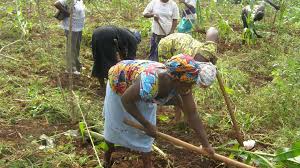The Acting National Project Coordinator of the West Africa Agricultural Productivity Programme (WAAPP), Mr. James Ocheme Apochi, says the project is the best platform for Nigeria to achieve its plan of making agriculture the economic back bone. JOHN OBA writes
He said WAAP, a 10-year Programme with 2 phases of 5years each empowered a total of 1,177,435 Nigerians from it assisted Commodity Value Chain Innovation Platforms (CVCIP) in June alone.
He stated this recently during an interaction with journalists in his office in Abuja on the activities of the project in Nigeria.
He said the project which is currently running in almost all the states of the federation had beneficiaries in Aquaculture, Cassava, maize, rice, sorghum, yam and mango processing.
Giving a breakdown, he said 240,200, people from 18 states benefited in aquaculture, 38,050, in cassava from eight states, 308,900 in maize from 12 states, 360,400, in rice from five states, 121,070 in Sorghum from seven states,145,365 in yam from six states and 1,500 in mango processing from four states.
He said the main objectives of WAAPP is to improve agricultural productivity while promoting regional integration as instruments for promoting shared growth and poverty reduction in West Africa.
“The development objective of WAAPP-Nigeria is to strengthen the National Agricultural Research System (NARS) to contribute to technology development, dissemination and adoption to boost agricultural productivity increases in Nigeria’s top agricultural commodity sub-sectors that are aligned with sub-regional priorities.
“The priority commodities for the WAAPP which have been derived from a study carried out by the International Food Policy Research Institute (IFPRI) and CORAF/WECARD in 2006 are: aquaculture, cassava, yam, sorghum, maize, rice and poultry,” he explained.
He said the project has four components which includes, enabling conditions for sub-regional cooperation in technology generation, dissemination and adoption, national Centre of Specialization in Aquaculture, funding of demand-driven technology, generation and adoption, project coordination, management, monitoring and evaluation.
While 1.5 million farmers, processors and marketers are expected to benefit directly from the project through the adopted villages of NARS and communities around them, rural families from the adopted Secondary Schools, innovation platforms and aquaculture families, among others.
He however stated that the challenges facing project is that untimely and inadequate release of counterpart fund from the Nigeria government which is $5 million in a project which funding stands at $56 million. `
He explained how the project has purchased and distributed four mango drying equipment in Longa-ewa Lakes, Niger State; Lidani farms, Gombe State; AT & S Nigeria LTD, Benue State; and Nobex Tech. Lagos State while facilitating access to markets and engaging with the private sector in seed multiplication, fish fingerlings multiplication, mango dryer and agricultural machines.
Speaking further on the technical strives of the project, he said: “The project has commenced provision of improved hybrid of cat fish. The fish strains from different ecological zones of Nigeria were successfully hybridised artificially to obtain hybrid of Clarias anguillaris with very fast growth. The improved breed is being multiplied for distribution to fish farmers will increases farmer’s income by 70%.”
“Also the project provided smoking kiln to some fish farmers across the country. WAAPP funded smoking kiln is detachable improved fish smoking equipment that enables processing of fish into high quality and highly competitive smoked dried fish and fish oil. The kiln is double walled, made of iron sheets insulated with mineral wool. It consists of four major segments and a fan is used to circulate heat and smoke
“Major advantage of the kiln is that it reduces smoking/drying time and drudgery associated with traditional smoking methods.It will also increases farmer’s income by 70% and reduces post-harvest losses to zero,” he explained.
On rice he said the project has introduced System of Rice Intensification (SRI) which was demonstrated in 70 plots of 0.25ha each in three states, namely, Ebonyi, Jigawa and Niger, with each yield ranging from 4.4 metric tons to 8 metric tons per hectares.
While also introducing biogas digester, with cheap source of energy and fertilizer for the rural communities that will play a role in the control of deforestation, plant disease and pests, create employment opportunities.
He explained further that the project is engaged in every aspect of agricultural production, engaging with the private sector in Seed multiplication, Fish Fingerlings multiplication, Agricultural machines among others. Developing cost effective, portable and environmental friendly equipment such as Solar Tent Dryer which is capable of producing stable dried fish products free of contamination from air borne dust and insects. A screened table designed to prevent insect from gaining access to the fish which enhances fish quality and with top compartment is a cage covered with a net to screen insects and flies.
The table surface according to him is covered with plastic material where the fish is places during sales. A small opening of 0.53m by 0.30m forms the access door.
He said: “The composite packaging materials were developed from paper and polyethylene. They are impervious to moisture, gases and vapor; protect the packed products from light, pest infestation, dirt and dust. Moreover, they reduce the usual odor associated with smoked fish.
“Maize, sorghum and rice varieties that are drought tolerant and early maturing are being multiplied and promoted by WAAPP.
“WAAPP is involved in the funding of demand-driven technology generation and adoption, and the dissemination of improved technologies through the adopted villages in 2012 with 52 adopted villages while in April 2015, the number of adopted villages increased to 296.
“We are collaborating with the National Agricultural Extension Research and Liaison Services (NAERLS) to disseminate technology and information about WAAPP to the general public,” he said.
Nigeria is currently working to ensure that the World Bank approved the extension of the project for the next five years.


